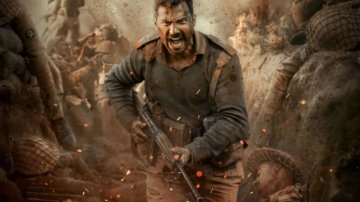Paltan movie review: The sad emptiness of war
ngocbaonguyen |Sep 08, 2018
Check out complete Paltan movie review where you find what to expect from movie
- True Love Does Exist! These 10 Bollywood Couples Were Best Friends Before They Turned Spouses
- Top 15 Most Desirable Men In India 2020 | A Year Of New Faces
- Drug Case Expanded: CBI Raided Arjun Rampal's House, Summoned Deepika's Manager After Arresting Top...
The film, Paltan, based on a 1967 Indo-Chinese skirmish near the Sikkim border, may be an attempt to have us empathise with the interminable dreariness of soldiers stationed in deadlock at a war zone. Nobody is supposed to move, and nobody does: not even the director.
It begins with a postman at night, knocking on each door to give families bad news about their loved ones. They instantly begin to wail, and the sound of crying is only amplified as the postman makes his way down the street and Dutta sets the stage for a loud war film about the casualties of war. Not later, we see Jackie Shroff as a Major General talking to Arjun Rampal who plays a Lieutenant Colonel, both of them speaking in English and pausing at strange points, giving the impression that we are watching a hurriedly dubbed foreign film.
Watch the Paltan trailer here
Rampal, when leaving the room, turns to Shroff and tells him he is his new idol, after having first looked up to Field Marshal Bernand Montgomery. Shroff places his elbow on his knee and his chin on his arm, as if posing for a portrait painter, before he says “I’m no hero.”
In Paltan, long stretches of on-field action are occasionally punctuated with trademark JP Dutta flashbacks of wives and lovers back home among verdant farm lands. Because there is such little craft to the enterprise, these come across as abruptly and overly manipulative as those backstage story where the contestant playscards with his family, cycles to work or boots up a computer.
Here the soldiers speak exclusively in idioms. Sonu Sood, cast as a tough-as-nails Major, has the worst of this as he says things like “weapons are a soldier’s limbs”, “soldiers don’t fight because of hate for the other army, but love for the ones they leave behind”. They are often in consecutive sentences, halting only to throw around the word “yaara” an awful lot. The hot-blooded Sikh warrior keeps invoking Waheguru, and keeps asking his colleagues for common English words like ‘common’ while being able to say things about the “demarcation of international boundaries” without a hiccup.
![]()
There isn’t much to be said about the ensemble cast, but their relative unfamiliarity serves them well in a film like this. Gurmeet Choudhary and Harshvardhan Rane commit fully to their parts, noses-flaring and eyebrows furrowing the brow, and at least they have the right energy for this kind of production.
The 1967 dispute Paltan is based on is intriguing, a one-day crossfire that ended with China waving the white flag — rather impressive considering their brutal victory over India in 1962. Paltan is mounted on a large enough scale, or at least it has enough uniformed extras to give that illusion, but what is the point to its overarching dullness?
There is a lot to be said about the futility of war, and now Dutta has made his case for the futility of the war movie.
- Tag

Comments
Sort by Newest | Popular